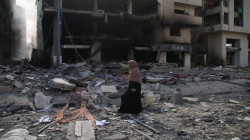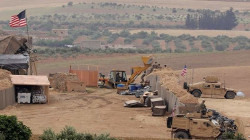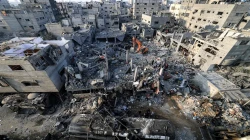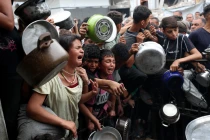Gen. Petraeus on Israel's Gaza attack and security breach

Shafaq News / Former CIA Director David Petraeus speculated that Israel may proceed with a ground attack in Gaza with the aim of destroying Hamas.
In an interview with "Al-Sharq News," Petraeus noted that given Israel's stated objectives related to eliminating Hamas's infrastructure, it is difficult to envision how these objectives can be achieved without a ground operation.
He further elaborated that such a ground operation would undoubtedly involve intense combat, significant and tragic civilian casualties that cannot be avoided, and damage to the region's infrastructure.
Petraeus, who led military operations in Iraq after the fall of Saddam Hussein's regime, acknowledged that Israel does not want to reoccupy Gaza, but this raises questions about who would manage humanitarian aid, restore essential services, rebuild damaged infrastructure, and ensure that Hamas and Islamic Jihad cannot rebuild their capabilities in the aftermath of a potential ground attack.
He drew on the lessons learned from the United States' experience in Iraq, warning against the potential for a power vacuum following a Gaza ground operation, which could lead to a situation akin to ISIS after the withdrawal of American combat forces in late 2011.
Petraeus also highlighted that the issue of who would govern Gaza after operations that might eliminate Hamas and its political wing is currently one of the most challenging questions on the horizon.
Addressing the possibility of indirect diplomatic initiatives to secure the release of more prisoners, Petraeus suggested that it is possible, especially with the recent release of two additional hostages by Hamas. However, he expressed skepticism that Israel would negotiate with them due to the high number of Israeli civilian casualties caused by Hamas, stating that Hamas's ultimate goal is to "destroy Israel and kill Jews."
Regarding the threat posed by Hezbollah's missile capabilities to Israel, Petraeus emphasized the grave nature of this threat, especially in light of concerns about opening a southern front in Lebanon. He discussed the potential for Tel Aviv to respond forcefully to a large-scale missile attack, resulting in substantial damage to Hezbollah's infrastructure, similar to the 2006 conflict.
Regarding the possibility of U.S. involvement in a conflict between Hezbollah and Israel, Petraeus emphasized the complexity of such a scenario, suggesting that it would depend on specific circumstances, the scope of the fighting, and Israel's need or willingness to receive assistance.
Furthermore, the region is experiencing an unprecedented escalation in tensions, with concerns over the expanding conflict and the potential for direct Iranian involvement or military confrontation between Hezbollah and the Israeli army.
Iranian Foreign Minister Hossein Amir-Abdollahian recently suggested that the US has called on Iran to exercise restraint and encouraged other regional parties to calm tensions. He also warned that Israel would become embroiled in an intractable situation if it mistakenly launched a ground attack on Gaza.
Petraeus, however, downplayed the likelihood of Iran engaging directly in a conflict with Israel. Instead, he suggested that Iran is more likely to continue its indirect support for proxy groups in the region, such as Hamas, Hezbollah, Shiite militias in Iraq and Syria, and the Houthi rebels in Yemen, enabling them to pose significant challenges to Israel.
Moreover, the retired general attributed the success of Hamas in breaching Israeli security during the attack on October 7 to significant improvements in the operational security of the organization. They employed information deception and managed to prevent Israeli intelligence agencies from discovering the attack plans, despite Israel's typical effectiveness.
He further explained that Hamas took advantage of Israel's preoccupation with the West Bank due to tensions there, as well as its domestic political disturbances. Operationally, Hamas managed to disable Israeli surveillance systems accurately by targeting communication towers that provided video feeds to control centers, from the border wall to command centers. They utilized innovative tactics to enter Israel during the execution of the attack.
Additionally, the general noted that the operation took place on a Saturday, a day for religious observance, which reduced military readiness. As a result, several factors converged, leading to a grave intelligence failure in Israel and a severe lack of military preparedness.





